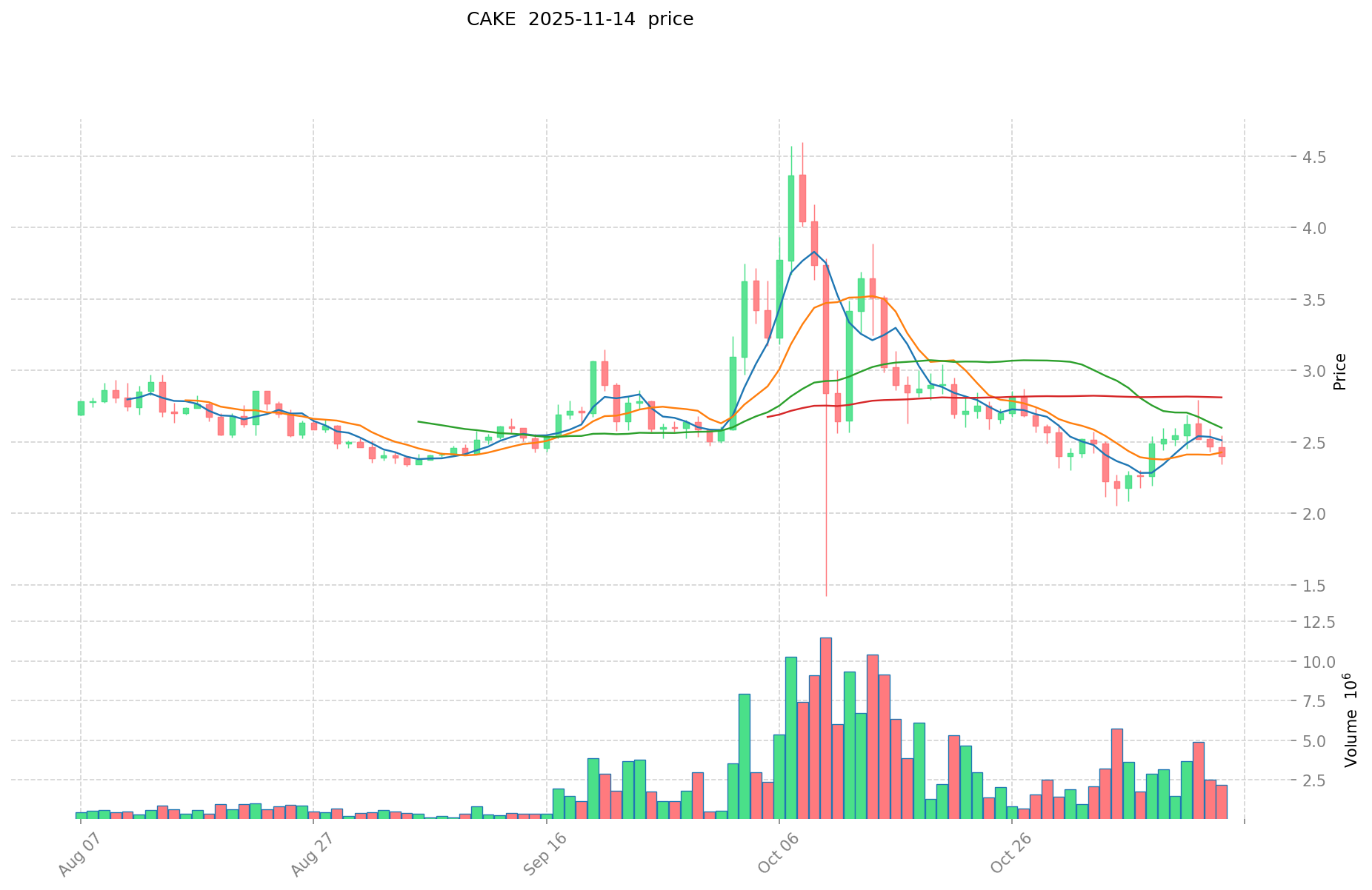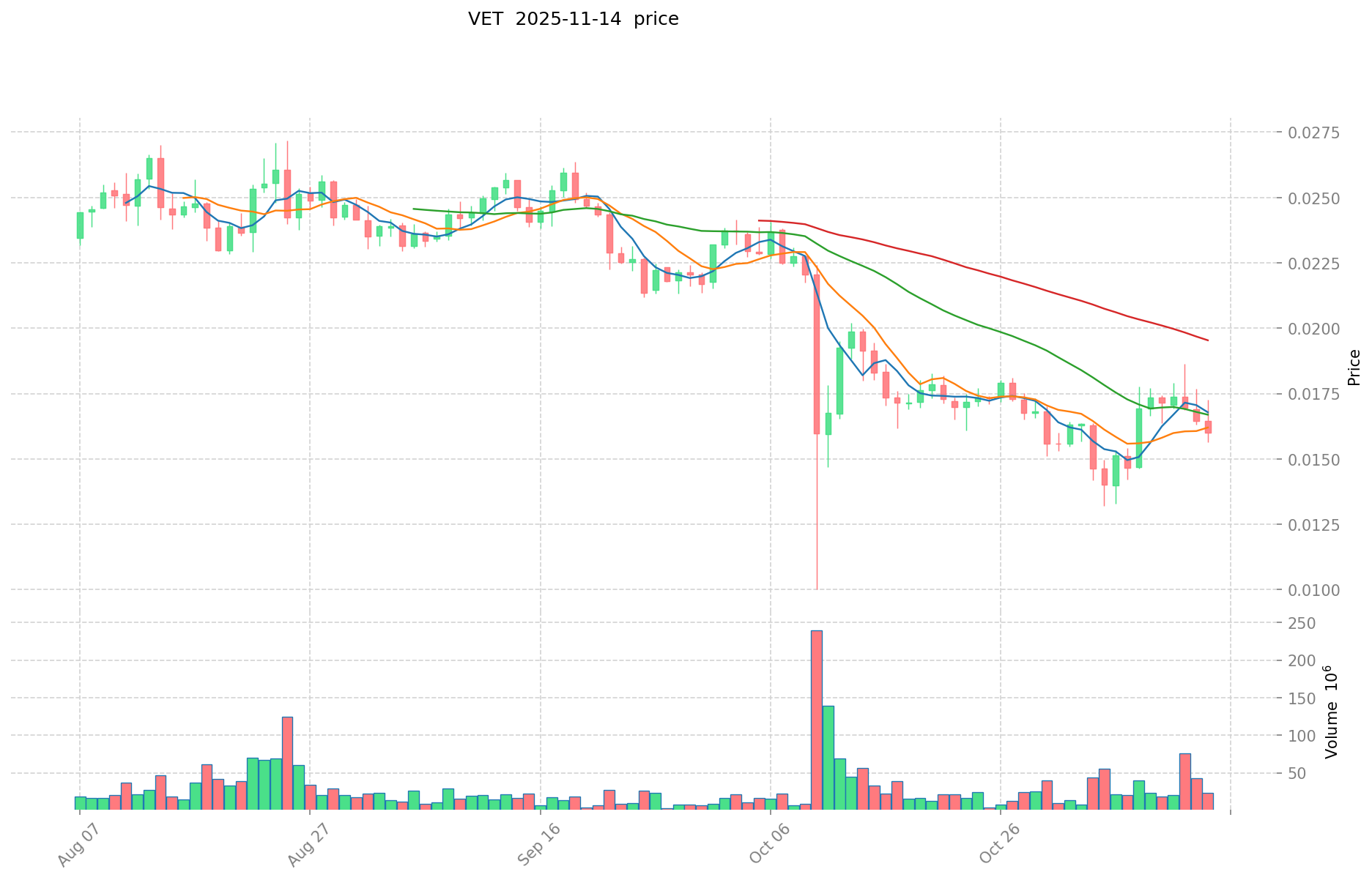CAKE vs VET: Which Crypto Asset Offers Better Staking Rewards?
Introduction: CAKE vs VET Investment Comparison
In the cryptocurrency market, PancakeSwap vs VeChain comparison has always been a topic that investors cannot avoid. The two not only have significant differences in market cap ranking, application scenarios, and price performance, but also represent different positioning in the crypto asset space.
PancakeSwap (CAKE): Since its launch in 2020, it has gained market recognition for its innovative automated market maker (AMM) mechanism on the Binance Smart Chain.
VeChain (VET): Launched in 2017, it has been hailed as a blockchain platform for supply chain management and business processes, aiming to create a trusted distributed business environment.
This article will comprehensively analyze the investment value comparison between CAKE and VET, focusing on historical price trends, supply mechanisms, institutional adoption, technological ecosystems, and future predictions, attempting to answer the question investors care about most:
"Which is the better buy right now?"
I. Price History Comparison and Current Market Status
CAKE and VET Historical Price Trends
- 2021: CAKE reached its all-time high of $43.96 on April 30, 2021, likely due to the growing popularity of decentralized exchanges on Binance Smart Chain.
- 2020: VET hit its all-time low of $0.00191713 on March 13, 2020, possibly influenced by the global market crash during the early stages of the COVID-19 pandemic.
- Comparative analysis: Since their respective peaks, CAKE has fallen from $43.96 to its current price of $2.411, while VET has declined from its all-time high of $0.280991 to $0.01575.
Current Market Situation (2025-11-15)
- CAKE current price: $2.411
- VET current price: $0.01575
- 24-hour trading volume: CAKE $6,285,938.55 vs VET $343,479.15
- Market Sentiment Index (Fear & Greed Index): 16 (Extreme Fear)
Click to view real-time prices:
- View CAKE current price Market Price
- View VET current price Market Price


II. Core Factors Affecting the Investment Value of CAKE vs VET
Supply Mechanism Comparison (Tokenomics)
-
CAKE: Inflationary tokenomics with emission reduction mechanisms; regular token burns to control supply inflation; farm emissions reduced through governance votes
-
VET: Fixed maximum supply of 86.7 billion tokens; two-token system where VTHO is generated by holding VET; deflationary mechanism through VTHO consumption
-
📌 Historical Pattern: Deflationary or controlled supply mechanisms tend to create stronger price support during accumulation phases, while excessive inflation can dilute token value without corresponding adoption growth.
Institutional Adoption and Market Applications
- Institutional Holdings: VeChain has partnerships with major enterprises like Walmart China, BMW, and DNV GL, while PancakeSwap has more retail-focused adoption
- Enterprise Adoption: VET has stronger enterprise applications in supply chain, logistics, and authentication; CAKE primarily serves as a DEX governance token with yield farming applications
- Regulatory Attitude: VeChain generally enjoys more regulatory clarity due to its enterprise focus and compliance initiatives, while PancakeSwap operates in a more uncertain DeFi regulatory landscape
Technical Development and Ecosystem Building
- CAKE Technical Upgrades: Integration of IFO 3.0, prediction markets, NFT marketplace, and perpetual trading; focus on improving UI/UX and reducing fees
- VET Technical Development: VeChainThor protocol with Proof of Authority consensus; enterprise-oriented toolkits like ToolChain and solution templates
- Ecosystem Comparison: PancakeSwap leads in DeFi services (liquidity pools, yield farming, lottery, NFT marketplace) while VeChain excels in supply chain solutions, carbon emissions tracking, and enterprise blockchain applications
Macroeconomic Factors and Market Cycles
- Performance in Inflationary Environments: VET potentially offers better protection with its fixed supply cap and enterprise utility
- Macroeconomic Monetary Policy: Both affected by broader crypto market sentiment, though VET's enterprise relationships may provide more stability during downturns
- Geopolitical Factors: VeChain's strong presence in Asia (particularly China) exposes it to regional regulatory risks but also opportunities; PancakeSwap faces general DeFi regulatory uncertainty globally
III. 2025-2030 Price Prediction: CAKE vs VET
Short-term Prediction (2025)
- CAKE: Conservative $1.33 - $2.41 | Optimistic $2.41 - $2.56
- VET: Conservative $0.0082 - $0.0158 | Optimistic $0.0158 - $0.0224
Mid-term Prediction (2027)
- CAKE may enter a growth phase, with prices estimated between $1.43 and $3.13
- VET may enter a bullish market, with prices estimated between $0.0154 and $0.0251
- Key drivers: Institutional capital inflow, ETF developments, ecosystem growth
Long-term Prediction (2030)
- CAKE: Base scenario $3.75 - $5.21 | Optimistic scenario $5.21+
- VET: Base scenario $0.0337 - $0.0459 | Optimistic scenario $0.0459+
Disclaimer: This analysis is based on historical data and market projections. Cryptocurrency markets are highly volatile and unpredictable. This information should not be considered as financial advice. Always conduct your own research before making investment decisions.
CAKE:
| 年份 | 预测最高价 | 预测平均价格 | 预测最低价 | 涨跌幅 |
|---|---|---|---|---|
| 2025 | 2.556826 | 2.4121 | 1.326655 | 0 |
| 2026 | 2.90682171 | 2.484463 | 1.81365799 | 3 |
| 2027 | 3.1269451318 | 2.695642355 | 1.42869044815 | 11 |
| 2028 | 3.49355249208 | 2.9112937434 | 1.950566808078 | 20 |
| 2029 | 4.2912469777716 | 3.20242311774 | 1.6332357900474 | 32 |
| 2030 | 5.208100716380562 | 3.7468350477558 | 3.222278141069988 | 55 |
VET:
| 年份 | 预测最高价 | 预测平均价格 | 预测最低价 | 涨跌幅 |
|---|---|---|---|---|
| 2025 | 0.0224218 | 0.01579 | 0.0082108 | 0 |
| 2026 | 0.028276732 | 0.0191059 | 0.015666838 | 21 |
| 2027 | 0.02511279496 | 0.023691316 | 0.0153993554 | 50 |
| 2028 | 0.0297705076856 | 0.02440205548 | 0.0224498910416 | 54 |
| 2029 | 0.040358559558372 | 0.0270862815828 | 0.015980906133852 | 71 |
| 2030 | 0.045862491975996 | 0.033722420570586 | 0.031361851130644 | 114 |
IV. Investment Strategy Comparison: CAKE vs VET
Long-term vs Short-term Investment Strategies
- CAKE: Suitable for investors focused on DeFi yield opportunities and ecosystem growth
- VET: Suitable for investors looking for enterprise adoption and supply chain applications
Risk Management and Asset Allocation
- Conservative investors: CAKE: 30% vs VET: 70%
- Aggressive investors: CAKE: 60% vs VET: 40%
- Hedging tools: Stablecoin allocation, options, cross-currency combinations
V. Potential Risk Comparison
Market Risks
- CAKE: High competition in DeFi space, potential market saturation
- VET: Dependency on enterprise adoption rates, economic cycles affecting supply chain industry
Technical Risks
- CAKE: Scalability issues on Binance Smart Chain, smart contract vulnerabilities
- VET: Centralization concerns with Proof of Authority consensus, potential bottlenecks in VTHO generation
Regulatory Risks
- Global regulatory policies may have differing impacts, with VET potentially facing less scrutiny due to its enterprise focus, while CAKE could be more affected by DeFi-specific regulations
VI. Conclusion: Which Is the Better Buy?
📌 Investment Value Summary:
- CAKE advantages: Strong DeFi ecosystem, high yield potential, regular token burns
- VET advantages: Enterprise partnerships, fixed supply cap, real-world use cases in supply chain management
✅ Investment Advice:
- Novice investors: Consider a balanced approach with a slight bias towards VET due to its enterprise backing
- Experienced investors: Explore yield farming opportunities with CAKE while maintaining a core position in VET
- Institutional investors: Focus on VET for its enterprise solutions and potential for long-term value appreciation
⚠️ Risk Warning: The cryptocurrency market is highly volatile, and this article does not constitute investment advice. None
VII. FAQ
Q1: What are the key differences between CAKE and VET? A: CAKE is the governance token for PancakeSwap, a DeFi platform on Binance Smart Chain, while VET is the native token of VeChain, a blockchain platform focused on supply chain management and enterprise solutions. CAKE has an inflationary tokenomics model with burn mechanisms, while VET has a fixed supply cap.
Q2: Which token has shown better price performance historically? A: Historically, CAKE reached a higher all-time high of $43.96 in April 2021, compared to VET's all-time high of $0.280991. However, both tokens have experienced significant declines since their peaks, with CAKE currently trading at $2.411 and VET at $0.01575.
Q3: How do the institutional adoption rates compare between CAKE and VET? A: VET has stronger institutional adoption, with partnerships with major enterprises like Walmart China, BMW, and DNV GL. CAKE, on the other hand, has more retail-focused adoption within the DeFi ecosystem.
Q4: What are the main risk factors for each token? A: For CAKE, the main risks include high competition in the DeFi space, potential market saturation, and regulatory uncertainties surrounding DeFi platforms. For VET, risks include dependency on enterprise adoption rates, economic cycles affecting the supply chain industry, and potential centralization concerns with its Proof of Authority consensus mechanism.
Q5: Which token is projected to have higher growth potential by 2030? A: Based on the provided projections, CAKE has a higher potential percentage increase by 2030, with an optimistic scenario of $5.21+ (over 116% increase from current price). VET's optimistic scenario for 2030 is $0.0459+ (about 191% increase from current price). However, it's important to note that these are speculative projections and actual performance may vary significantly.
Q6: How should investors allocate their portfolio between CAKE and VET? A: The allocation depends on an investor's risk profile. Conservative investors might consider a 30% CAKE to 70% VET ratio, while more aggressive investors could opt for a 60% CAKE to 40% VET split. It's crucial to diversify and not invest more than one can afford to lose.
Share
Content